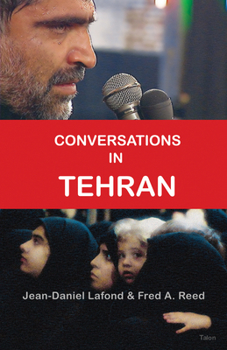Conversations in Tehran
In early 2004, filmmaker Jean-Daniel Lafond (Salam Iran, a Persian Letter) and author Fred A. Reed (Persian Postcards: Iran after Khomeini) returned to Iran after a two-year absence--on the eve of the parliamentary elections that were to seal the political defeat of the Reform movement. They had come to interview several of the men and women who had propelled Mohammad Khatami to the presidency in 1997, with a mission to rebuild a civil...
Format:Paperback
Language:English
ISBN:0889225508
ISBN13:9780889225503
Release Date:October 2006
Publisher:Talonbooks
Length:224 Pages
Weight:0.78 lbs.
Dimensions:0.6" x 6.1" x 9.0"
Customer Reviews
1 rating
The unfinished revolution
Published by Thriftbooks.com User , 17 years ago
Is the Iranian revolution of 1979 dead? Most of us have left that to the Wall Street journalists to answer, well not if you are part writer and part film-maker and know how to get the Iranians talking in a chai khana, easier than getting them thinking loud, an exercise not all Iranians do for a living. Conversations in Tehran is a book about two persons quest for getting a glimpse of where this 2500 year old caravan is heading especially in a part of the world that is rapidly being shaped by the post September 11 type militant democracy. The book is a journey into the democratic ideals of a deeply religious state, which beginning to open its mind about its worst fears. The more optimistic of the two authors, Fred Reed has traveled to Iran 28 times more than most expatriate Iranians do, trying to find out who speaks for the Iranians? Is it the 14th century poet Hafiz, the late Imam, Khomeini or the powerless women who faithfully wear the colour of mourning? The veteran film-maker Jean-Daniel Lafond did not take much convincing to unwind the emotions that lay trapped in the center of every day Iranians whose perception of life, death or dogma is hardly understood on this side of the civilizing world. The two authors exchange pen without letting up their critical lenses. The conversations focus between the flamboyant take-over of the reformists through popular votes in 1997 and their balance sheet in 2004 through the eyes of its makers, betrayers or side-liners going back to the heady days of the first revolution on 1979. In Iran where Ashura is evocative of the triumph of human dignity over tyranny can also draw the ideological line between two political opponents. The book makes it difficult to disagree that the revolution delivered the people from a feudal lord, only to fit into its shoes when the revolutionaries become tormentors, arbiters and aloof from the people they wished to free. Freedom in Iran like most of the liberated world is loaded with everything it does not offer the other. Conversations in Tehran bring out an interesting crowd of characters from all walks of the town, from the sultry Zourhane to the uptown high-rises, from married to the revolution to simply `Mary'. The image of the revolution changed in Iran, with demographics, political realities and time, but in the west the turbaned Iran has not flickered, absolutist in its political culture and time-warped in its identity. The conversations may sound disparate at times for a society that has been around longer than Aristotle, as they mirror a fractious society striving for personal as well as communal values to live and die for, in no unfamiliar way. The stories ran from the Sarcheshmeh neighbourhood, south of Tehran, the cannon fodders of the heady days of the revolutions to eight years in the battlefields ending up in the highest offices in 2005 with botched dreams and lost hopes. In Iran the rules of crossing the path of the Supreme Guide is clearly more suicidal tha





